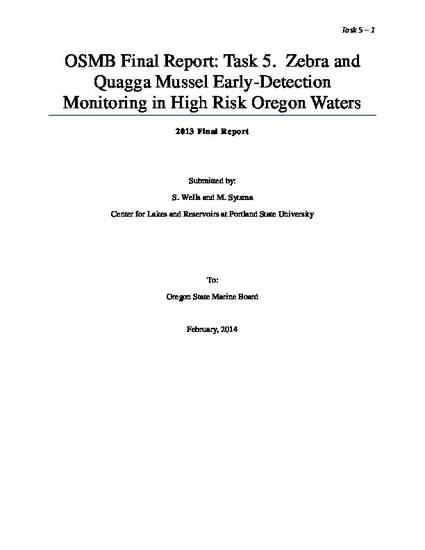
- Invasive aquatic organisms -- Oregon -- Control,
- Aquatic ecology -- Oregon,
- Environmental monitoring -- Oregon
Neither zebra nor quagga mussels (Dreissena polymorpha and D. rostriformis bugensis, respectively) were detected by Portland State University (PSU) during their early detection sampling in Oregon water bodies during 2013. PSU conducted sampling for planktonic larvae, juvenile, and adult mussels at nine Oregon water bodies during the July to August period coinciding with water temperatures favorable for mussel spawning. A total of 113 plankton samples were collected and over 1.6 million liters of lake water were filtered through 63-μm mesh nets during plankton sample collection. The greatest sampling effort occurred in East Lake, Prineville Reservoir, and Paulina Lake; these water bodies were identified as high risk for both mussel establishment and introduction according to Wells et al. (2009). The sampling effort, however, was fairly uniform amongst the targeted water bodies, and sampling also occurred in Upper Klamath Lake, Howard Prairie Lake, Hyatt Reservoir, Emigrant Lake, Ochoco Reservoir, and Lake Billy Chinook. Non-native invertebrates and macrophytes were opportunistically collected during Dreissena spp. sampling in 2013. Corbicula fluminea (Asian clam) straight-hinge juveniles were collected in plankton samples from East Lake and Howard Prairie Lake. Potamopyrgus antipodarum (New Zealand mud snails) were collected in Lake Billy Chinook. Radix auricularia (big-ear radix) snails were collected in Hyatt Reservoir, Lake Billy Chinook and Paulina Lake. Orconectes neglectus (ringed crayfish) were collected in Hyatt Reservoir. Potamogeton crispus (curly leaf pondweed) were collected in Howard Prairie Lake, Hyatt Reservoir, Lake Billy Chinook, and Upper Klamath Lake. Most of these collections were not the first detections for these species in these locations; however, to the authors’ knowledge, the following represent first detections: R. auricularia in Hyatt Reservoir and Paulina Lake, O. neglectus in Hyatt Reservoir and C. fluminea in Howard Prairie Lake.
Available at: http://works.bepress.com/scott_wells/68/

Submitted by: S. Wells and M. Sytsma Center for Lakes and Reservoirs at Portland State University To: Oregon State Marine Board